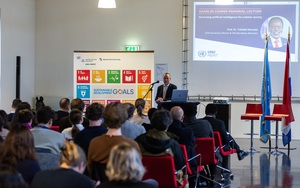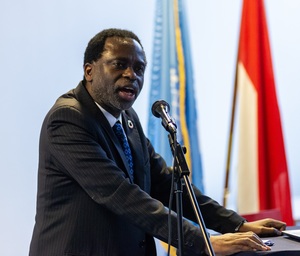The Rector and AI expert delivers flagship lecture on the accelerating technology
On 26 October 2023, UNU-MERIT hosted the seventh instalment of its flagship Charles Cooper Memorial Lecture Series, named for the institute’s first director. United Nations University (UNU) Rector and artificial intelligence expert Professor Tshilidzi Marwala delivered the lecture “Governing artificial intelligence for a better society,” following an introduction from the institute’s director Bartel Van de Walle. Prof. Marwala is also a member of the UN Scientific Advisory Board and former Vice-Chancellor of the University of Johannesburg.
Here is a brief summary of the key points that Prof. Marwala shared.
Three types of artificial intelligence (AI) are dominant today: prediction machines, clustering machines and generative machines.
Prediction machines forecast future outcomes based on historical data – they simply rearrange their given input to provide an output; to train them, one must reinforce the relationship between the input and the output. Clustering machines are used for grouping similar data points based on certain characteristics, such as for customer segmentation in marketing. Generative machines, such as ChatGPT, are able to create new content – such as images, text or even music – that resembles human-created content based on algorithms that learn patterns from existing data.
Advancements in AI are accelerating yet mostly unregulated.
Decision-makers cannot keep pace with AI technology’s development. It is essential regulatory efforts are pushed, as the alternative risk is – in the words of Tristan Harris (co-founder and executive director at the Center for Humane Technology) – creating a “digital Frankenstein.”
The office of the UN Secretary-General’s Envoy on Technology has created a High-Level Advisory Body on Artificial Intelligence, which aims to create a governance framework for AI that maximises the beneficial applications of this technology and minimizes its (potentially) harmful applications.
Data is at the core of AI governance needs.
A key governance challenge is the issue of incomplete or missing data, which is more prevalent in the Global South as opposed to the more data-complete countries of the Global North. If full data is not available, then we see that the AI algorithms do undesirable things, such as discriminating against or being less accurate about the digital minority, for example. Synthesised data can be used to alleviate this data poverty in the Global South, though this is less reliable than using real data. The synthesis of data can also be used to create AI-generated fake videos (known as deepfakes), which can be weaponised. UNU has recently issued a policy brief with guidelines on the use of synthetic data to train AI models.
Additionally, there is the issue of restricted cross-border data flow. Prof. Marwala shared the opinion that certain data must be allowed to flow freely across borders, such as data related to climate and sustainable development, so that scientists can create more accurate models.
We are in a new technological age that requires a holistic approach.
Multidisciplinary education is also crucial for understanding and further developing AI. For the first time, ideas from various disciplines not traditionally related to information technology are entering the field of AI development. Psychology’s concept of reinforcement learning, for example, is now a subset of machine learning that enables an AI-driven system to learn in a trial-and-error fashion, through receiving positive or negative feedback (this is how Google DeepMind trained its AI system AlphaGo).
In line with UNU’s mandate to leverage education and research for sustainable development, Prof. Marwala stressed the message that AI literacy is key. Having risky versus sustainable, positive outcomes depends on education and responsible action from everyone, he concluded.
ANY COMMENTS?
NOTA BENE
The opinions expressed here do not necessarily reflect the views of UNU.
MEDIA CREDITS
Photos by H. Pijpers / UNU-MERIT





